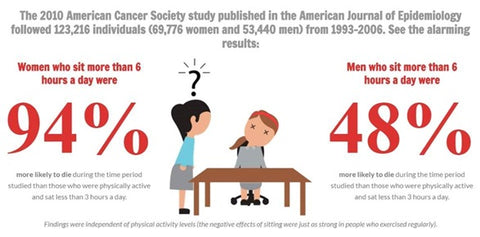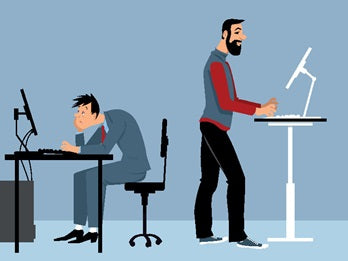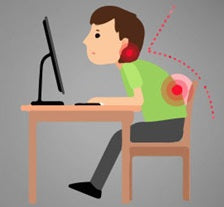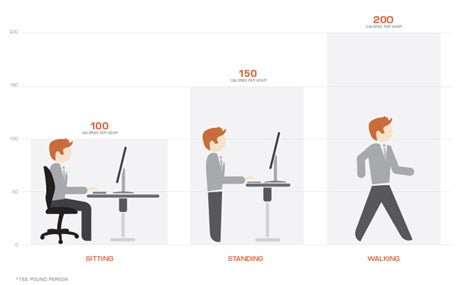The Shocking Risks of Sitting
How many hours a day do you spend sitting?
What if you added up all the time you spend watching TV, sitting in the car and using your computer? One study found that the average adult spends 50 - 60% of their day in sedentary pursuits. [i]

And why does this matter?
If you want to live a long and healthy life, then it truly matters!
Study after study has found that the more time spent sitting the greater the risk of dying. One meta-analysis determined that each hour of daily sitting time was associated with a 2% increase in dying from all causes.[ii] Another study looking at all-cause mortality across 54 countries world wide found that between 4 and 7% of all deaths were caused by sitting.[iii]

Wait a minute, what about all that time you spend at the gym?
When the Journal of Medicine and Science looked at the association of sitting time and mortality they discovered that even among people exercising daily, it was still the amount of time spent sitting that increased their risk of all-cause and cardiovascular mortality.[vi] More and more studies are coming to the conclusion that 30 minutes of daily physical activity is not enough to counteract the negative effects of sitting all day.
“Public health messages and guidelines should be refined to include reducing time spent sitting.” [vii]
The Simplest Way to Live Longer
Before you run out and quit your desk job, consider this simple solution: an electric Sit Stand Desk will allow you to decrease the amount of time you spend sitting every day while still getting your work done. At the push of a button you can change your position from sitting to standing and potentially add years to your life.

According to the study “Sedentary Behavior and Life Expectancy in the US,” you can add 2 1/2 years to your life if you limit your time sitting to less than 3 hours a day.[viii]
If that wasn’t convincing enough, consider one of the first studies of physical activity at work. 1950’s London bus drivers were found to have a two-fold increase in their risk of coronary heart disease compared to their more active counterparts – the conductors who collected tickets.[ix] Since then study after study has strongly and consistently associated time spent sitting with diabetes, cardiovascular disease, and all-cause mortality.[x]
The Surprising Benefits of Standing
In addition to adding years to your life, incorporating standing into your daily work routine can offer these benefits as well:
1. Reduced Neck and Back PainDo you suffer from upper back and neck pain when sitting at your desk all day? Office workers in Minneapolis took part in a 7 week study to determine the effect of using a standing desk for a total of one hour per day. Participants reported a 54% reduction in upper back and neck pain. Interestingly, after two weeks of not using a standing desk, the pain returned![xi]
Another study found a 32% reduction in lower back pain when participants intermittently used a standing desk throughout the day.[xii]

Participants in the Take-a-Stand Project were asked about the specific benefits of alternating between a seated and standing position at work after one month of using a sit stand desk. Their responses were as follows:
- 87% felt more comfortable
- 87% felt energized
- 75% felt healthier
- 71% felt more focused
- 66% felt more productive
- 62% felt happier[xiii]
Office workers in another study who alternated every 30 minutes between sitting and standing had a 15% reduction in their total fatigue score compared to when they worked seated for 8 hours.[xiv]

If the health benefits are not enough to convince you to invest in a sit stand desk, then maybe this study looking at productivity will persuade you. 167 call center employees were monitored over a 6 month period and it was found that the users of stand-capable desks were 45% more productive on a daily basis compared to their seated counterparts.[xv]

To those of you still not convinced, using a sit stand desk is the easiest way to burn more calories with minimal effort. In the study, “Standing Based Office Work,” the energy expenditure of office workers was compared following an afternoon spent sitting and an afternoon spent standing. Participants burned an average of 174 kcal more when standing then when they were sitting. In addition, the amount of glucose in participants blood after lunch was 43% lower on the afternoons they stood.[xvi]

The science is painfully clear: too much sitting is literally killing us. Type 2 Diabetes, cancer, cardiovascular disease, obesity and long-term mortality have all been linked to sitting in isolation. Even a healthy diet and daily exercise cannot negate the cumulative impact of sitting. Why not try the most direct solution and spend some time at work standing?
To Visit our Sit Stand Desks page click here
To Download this report in a PDF click here
[i] Healy, G. N., Matthews, C. E., Dunstan, D. W., Winkler, E. A., & Owen, N. (2011). Sedentary time and cardio-metabolic biomarkers in US adults: NHANES 2003-06. European heart journal, 32(5), 590-7.
[ii] Chau JY, Grunseit AC, Chey T, Stamatakis E, Brown WJ, Matthews CE, et al. (2013) Daily Sitting Time and All-Cause Mortality: A Meta-Analysis. PLoS ONE 8(11): e80000. https://doi.org/10.1371/journal.pone.0080000
[iii] Rezende, Leandro Fornias Machado et al. (2011) All-Cause Mortality Attributable to Sitting Time. American Journal Of Preventative Medicine, Volume 51, Issue 2, 253-263.
[iv] Patel, A. V., Bernstein, L., Deka, A., Feigelson, H. S., Campbell, P. T., Gapstur, S. M., Colditz, G. A., … Thun, M. J. (2010). Leisure time spent sitting in relation to total mortality in a prospective cohort of US adults. American journal of epidemiology, 172(4), 419-29.
[v] “Women and Men Who Sit More Than 6 Hours Per Day Image”. Two Guns Training Systems Blog. 5 July 2015.
[vi] Katzmarzyk, Peter T., Church, Timothy S., Craig, Coral L., Bourchard, Claude. (2009) Sitting Time and Mortality From All Causes, Cardiovascular Disease, and Cancer. Medicine & Science in Sports & Exercise, Volume 41, Issue 5, 998-1005.
[vii] Patel, A. V., Bernstein, L., Deka, A., Feigelson, H. S., Campbell, P. T., Gapstur, S. M., Colditz, G. A., … Thun, M. J. (2010). Leisure time spent sitting in relation to total mortality in a prospective cohort of US adults. American journal of epidemiology, 172(4), 419-29.
[viii] Katzmarzyk, P. T., & Lee, I. M. (2012). Sedentary behaviour and life expectancy in the USA: a cause-deleted life table analysis. BMJ open, 2(4), e000828. doi:10.1136/bmjopen-2012-000828
[ix] Morris, J.N., Heady, J.A., Raffle, P.A.B., Roberts, C.G., and Parks, J.W., 1953. Coronary heart disease and physical activity of work. Lancet 265, 1111-1120.
[x] Wilmot, E.G., Edwardson, C.L., Achana, F.A. et al. (2012) Sedentary time in adults and the association with diabetes, cardiovascular disease and death: systematic review and meta-analysis. Diabetologia (2012) 55: 2895. https://doi.org/10.1007/s00125-012-2677-z
[xi] Pronk, N. P., Katz, A. S., Lowry, M., & Payfer, J. R. (2012). Reducing occupational sitting time and improving worker health: the Take-a-Stand Project, 2011. Preventing chronic disease, 9, E154.
[xii] Thorp AA, Kingwell BA, Owen N, et al. (2014) Breaking up workplace sitting time with intermittent standing bouts improves fatigue and musculoskeletal discomfort in overweight/obese office workers. Occupational and Environmental Medicine. Volume 17, Issue 11, 765-771.
[xiii] Pronk, N. P., Katz, A. S., Lowry, M., & Payfer, J. R. (2012). Reducing occupational sitting time and improving worker health: the Take-a-Stand Project, 2011. Preventing chronic disease, 9, E154
[xiv] Thorp AA, Kingwell BA, Owen N, et al. (2014) Breaking up workplace sitting time with intermittent standing bouts improves fatigue and musculoskeletal discomfort in overweight/obese office workers. Occupational and Environmental Medicine. Volume 17, Issue 11, 765-771.
[xv] Gregory Garrett, Mark Benden, Ranjana Mehta, Adam Pickens, Camille Peres & Hongwei Zhao (2016): Call Center Productivity Over 6 Months Following a Standing Desk Intervention, IIE Transactions on Occupational Ergonomics and Human Factors, DOI: 10.1080/21577323.2016.1183534
[xvi] Buckley JP, Mellor DD, Morris M, et al. Standing-based office work shows encouraging signs of attenuating post-prandial glycaemic excursion. (2014) Occupational and Environmental Medicine. Volume 71, Issue 2, 109-111.